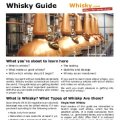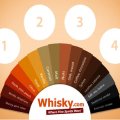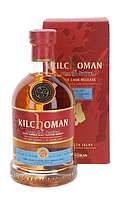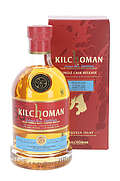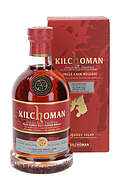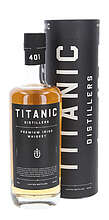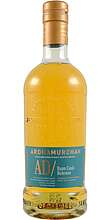Sherry and Wine Cask Matured Whiskies
According to the British Whisky regulations, Scotch Malt Whiskies mature in oak casks [12]. Whether the casks are new or held other liquids like Wine or other Whiskies before is not regulated by the law.
Since Whisky takes up colour from the wood (mostly caramelised wood sugar), it is classified as a 'brown spirit' in the alcohol industry. Vodka, which is usually colourless, is called 'white spirit' in the industry jargon. Whisky does not only take up colour but also additional flavours that come from the thermally treated cask wall as well as from the liquid that the cask held before. Casks that have already been used to mature Scotch Whisky are called refill casks.
The cask most commonly used to mature Scotch Malt Whisky is the American ex-Bourbon cask. The reason lies in the Bourbon Act, a U.S. law from 1964 [13], which regulates that Bourbon producers must use virgin casks made from American white oak (quercus alba). The Scots have been using these numerous ex-Bourbon casks for the maturation of their own Whisky for more than a century. Since these casks still give off aromas even after the second filling with Scotch raw Whisky, it has become the custom in Scotland to use them several times. With each filling these casks give off less aromatic substances so the influence of the cask decreases and thus the Whisky becomes brighter after each filling.
That is why since some decades the practice of filling Scotch Malt Whiskies from one cask into another during maturation has been established. This method is most often used to bring additional aromas into weakly matured Whiskies. The refilling into more active casks is called finishing.
There are two basic types of oak wood: American white oak, which gives off mild and smooth flavours, and the European oak, which gives off spicy and even bitter flavours. In the past mostly European oak was used for the barrique maturation of European wines. At a rough guess, two thirds of all European barrique wines are nowadays matured in cheap American oak casks for financial reasons.
It is important for the taste of a Whisky which type of Wine a cask held before, because after emptying between 2 and 6 litres of liquid can remain in the pores of the oak staves of a cask. Casks used for Sherry, Port, Madeira, Marsala and recently Red and White Wine of all kinds are popular in the Whisky industry.
For this study the author made no difference between the Wine casks used. Whether a weakly matured Whisky was finished or whether the Whisky was exclusively matured in 1st or 2nd fill casks was also of no significance. The samples in this chapter were classified only according to the last cask used during maturation. This information can typically be found on the bottle label or is available from the manufacturer.
Table 8. Statistical Summary of the Results for Sherry or Wine cask matured Whiskies
| Sherry and wine cask bottlings | Count | Percent |
|---|---|---|
| Amount of samples | 611 | 45,9% |
| Amount of chill filtered samples | 305 | 49,9% |
| Amount of non chill filtered samples | 306 | 50,1% |
| positive identified chill filtrations | 144 | 47,2% |
| non positive identified chill filtrations | 161 | 52,8% |
| positive identified non chill filtrations | 164 | 53,8% |
| non positive identified non chill filtrations | 142 | 46,4% |
| positiv identified filltrations | 308 | 50,4% |
| not positiv identified filtrations | 303 | 49,6% |
| Mean | ||
| Average quality chill filtration | 3,6 | |
| Average quality non chill filtration | 3,6 |
The results from this subset are not significantly different from the results for all samples. Chill filtration tends to be identified correctly a bit more often.
The higher quality rating for these bottlings, however, is interesting. On average these samples were rated 5% (0.2 scale points) better than the average quality (3.4 points) of all samples.
Table 9. Statistical Summary of the Results for Whiskies not Matured in Sherry or Wine Casks
| Non Sherry and Wine Cask Bottlings | Count | Percent |
|---|---|---|
| Amount of samples | 720 | 54,1% |
| Amount of chill filtered samples | 359 | 49,9% |
| Amount of non chill filtered samples | 361 | 50,1% |
| positive identified chill filtrations | 154 | 42,9% |
| non positiv identified chill filtrations | 205 | 57,1% |
| positive identified non chill filtrations | 202 | 56,0% |
| non positive identified non chill filtrations | 159 | 44,0% |
| positive identified filtrations | 356 | 49,4% |
| non positive identified filtrations | 364 | 50,6% |
| Mean | ||
| Average quality chill filtration | 3,2 | |
| Average quality non chill filtration | 3,2 |
These results are also not surprising. Solely the lower quality rating (3.2 points) shows that the participants clearly prefer Sherry or Wine cask matured Single Malt Whiskies.



